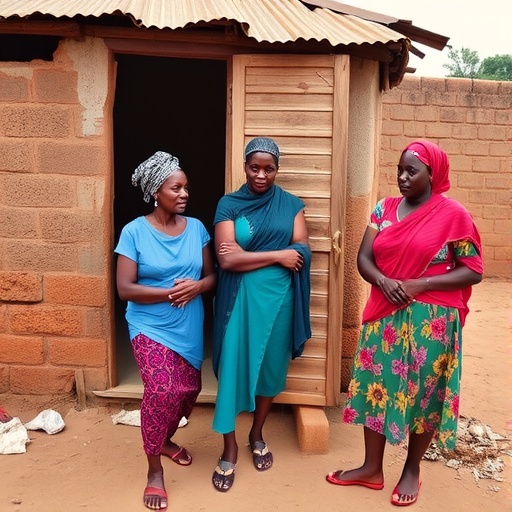Understanding sanitation behavior in Ghana represents a significant intersection of socio-economic factors, individual choices, and cultural practices. In a recent study, researchers K. Tawiah, R.K. Ansah, and K.A. Asosega delve deep into the nuances of sanitation habits among Ghanaian women, emphasizing the roles that wealth and residential contexts play in shaping these behaviors. The findings reveal a complex tapestry of influences that highlight not only the immediate implications for health and hygiene but also broader socioeconomic dynamics at play in Ghana.
Cleanliness and sanitation are often viewed through a purely public health lens, but this research illustrates how intertwined these issues are with the socio-economic fabric of communities. The study’s results indicate that wealth disparities significantly impact women’s decision-making processes regarding sanitation practices. Wealthier women, armed with more resources and better access to information, tend to adopt more hygienic sanitation solutions compared to their counterparts from lower economic strata. This disparity highlights an urgent need for targeted interventions that address the unique challenges faced by economically disadvantaged groups.
Residential context also plays a critical role in shaping sanitation behavior. Women living in urban settings often experience different sanitation challenges compared to those in rural areas. Urban women frequently contend with overcrowded living conditions and inadequate waste management systems, which complicate their ability to maintain proper hygiene. In contrast, women in rural areas may have more space but face challenges related to access to sanitation facilities and resources. The research underscores how these distinct environments shape both the availability and quality of sanitation solutions.
Moreover, the influence of cultural beliefs and practices cannot be overstated. In various Ghanaian communities, traditional practices surrounding sanitation are deeply embedded in daily life. Some women may adhere to these practices despite the availability of better alternatives, demonstrating how cultural norms can impede the adoption of improved sanitation behaviors. Understanding these cultural dimensions is crucial for devising effective educational campaigns and resource allocations that resonate with local populations.
The study also highlights the importance of community engagement in addressing sanitation issues. By involving local leaders and stakeholders in the conversation, researchers can create more targeted and effective interventions. Community-based approaches can help bridge cultural gaps and ensure that educational efforts are both respectful and relevant to local customs. This participatory model can amplify the effectiveness of programs aimed at improving hygiene and sanitation practices among women.
Access to information is another critical factor in sanitation behavior. The research indicates that many women lack adequate information about sanitation’s health impacts and available resources to improve their practices. This gap underscores the need for comprehensive education initiatives that not only provide information but also empower women to make informed choices regarding their sanitation options. Knowledge can be a powerful tool in changing behaviors and enhancing overall public health.
Additionally, the economic benefits of improving sanitation practices are profound. The research suggests that investing in better sanitation infrastructure and education for women can lead to significant health improvements and economic gains. Healthier individuals are more productive in their daily lives, reducing the burden of disease on families and communities. This economic angle can be a persuasive argument for policymakers and stakeholders to prioritize sanitation improvements.
As the researchers continue to analyze their data, they propose that future studies delve deeper into the implications of climate change on sanitation behavior. With the increasing unpredictability of weather patterns, the availability and accessibility of clean water and sanitation facilities may change dramatically. Understanding how these shifts will impact women’s choices and behaviors is crucial in formulating long-term strategies to address sanitation challenges.
Implementing sustainable sanitation practices that are sensitive to local contexts requires a multi-faceted approach that incorporates economic, social, cultural, and environmental factors. Solutions such as decentralized wastewater treatment systems, rainwater harvesting, and eco-friendly toilet designs can be effective if adopted with an understanding of the local landscape. This research encourages interdisciplinary collaboration among engineers, public health experts, and sociologists to create impactful solutions.
As Ghana embarks on its journey toward improved sanitation outcomes, the role of international partnerships and collaborations cannot be overlooked. Engaging with global organizations that focus on sanitation issues can help bring additional resources, expertise, and advocacy to local initiatives. These partnerships can also promote knowledge sharing and best practices that have been effective in other regions.
In conclusion, understanding sanitation behavior in Ghana requires an appreciation of the interplay between wealth, residential contexts, cultural norms, and information access. As research continues to unfold, it offers valuable insights that can inform policies and programs aimed at enhancing sanitation practices among women in Ghana. The findings advocate for a holistic strategy that recognizes not only the technical aspects of sanitation but also the social and economic fabrics that shape women’s choices.
The urgency of the situation calls for immediate action from all stakeholders involved in public health, urban planning, and community development. As Ghana moves forward, it is imperative that the voices of women are at the forefront of sanitation conversations, ensuring that their needs and experiences inform future solutions. Only then can the nation hope to achieve equitable and sustainable sanitation outcomes for all its citizens.
Subject of Research: Sanitation behavior among Ghanaian women in relation to wealth and residential contexts.
Article Title: Understanding sanitation behaviour in Ghana: the impact of wealth and residential contexts on Ghanaian women’s choices.
Article References:
Tawiah, K., Ansah, R.K., Asosega, K.A. et al. Understanding sanitation behaviour in Ghana: the impact of wealth and residential contexts on Ghanaian women’s choices.
Discov glob soc 3, 125 (2025). https://doi.org/10.1007/s44282-025-00254-w
Image Credits: AI Generated
DOI: https://doi.org/10.1007/s44282-025-00254-w
Keywords: sanitation behavior, Ghana, women, wealth, residential context, public health, cultural norms, community engagement, education, sustainability, climate change.




